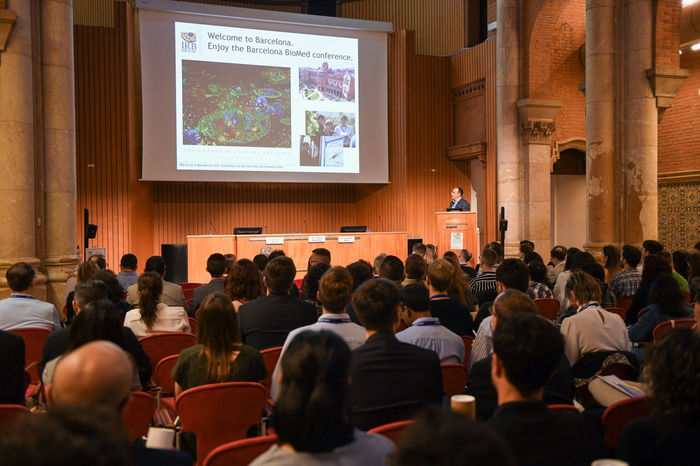Targeted protein degradation uses different types of “degrading” drugs (degraders) to force proximity between a target protein (for example, a mutated protein that contributes to the development of a disease) and the cellular machinery that directs protein degradation. By inducing such proximity, the target proteins are marked for destruction by the cellular proteasome.

Credit: IRB Barcelona
- The BBVA Foundation and IRB Barcelona are bringing together more than 150 scientists from all over the world to discuss the latest advances in this promising field.
- Proximity induction-based pharmacology uses the machinery of the cell itself to remove or modify harmful proteins and other biomolecules.
- The 39th Barcelona BioMed conference is being held in Barcelona between 22 and 24 May.
Targeted protein degradation uses different types of “degrading” drugs (degraders) to force proximity between a target protein (for example, a mutated protein that contributes to the development of a disease) and the cellular machinery that directs protein degradation. By inducing such proximity, the target proteins are marked for destruction by the cellular proteasome.
This week, the Institute for Research in Biomedicine (IRB Barcelona) and the BBVA Foundation are hosting the 39th Barcelona BioMed Conference—an event in which leading figures can exchange ideas and discuss the latest advances in the field of proximity induction-based pharmacology. The “Proximity-inducing pharmacology: Targeted protein degradation and beyond” conference, co-organised by Dr. Cristina Mayor-Ruiz, from IRB Barcelona, and Dr. Georg E. Winter, from the CeMM Research Center for Molecular Medicine in Vienna (Austria), is being held in Barcelona between 22 and 24 May. Dr. Mayor-Ruiz and Dr. Winter are experts in the development of “degraders”.
The event will involve the participation of international experts from academia and industry, such as Dr. Jay Bradner, a renowned scientist in the field and founder of several start-ups, Dr. Craig M. Crews from Yale University and Dr. Alessio Ciuli from the CeTPD at the University of Dundee, both experts in PROTACs (a type of “degrader”), and Dr. Heidi Greulich from the Broad Institute of MIT and Harvard. The event will also include representatives from the biotech industry and pharmaceutical sectors.
“It is a great honour to be able to organise this conference, in which international figures of this level are participating. Through the exchange of ideas over these days, we hope that new projects and collaborations will emerge that will advance the field,” says Dr. Mayor-Ruiz, head of the Targeted Protein Degradation and Drug Discovery laboratory at IRB Barcelona. Dr. Mayor-Ruiz will give her talk in a highly anticipated session dedicated to “molecular glue”-type drugs. These kinds of degraders are small molecules that promote interactions between proteins or other biomolecules, thereby facilitating their interaction and presenting very interesting properties as a result of their pharmacokinetic characteristics.
New horizons in proximity-inducing pharmacology
Targeted protein degradation is based on a protein degradation process within cells discovered by Drs. Aaron Ciechanover, Avram Hershko, and Irwin Rose, who were awarded the Nobel Prize in Chemistry in 2004. The field has since opened up new approaches to address diseases that had no cure and to block proteins and processes that were thought impossible to treat with conventional drugs.
Proximity induction-based pharmacology is expanding and now also contemplates the modification or degradation of other biomolecules, such as RNA molecules and bacterial proteins.
“What makes this conference unique, in addition to the high scientific level of the speakers, is that it focuses on exploring the enormous potential of this technology. Working in a novel field like this, which is constantly evolving, is very exciting,” comments Dr. Winter, co-organiser of the event and researcher at CeMM Austria. Dr. Winter will also be participating in the session devoted to molecular glues on Monday.
Computational science in the discovery of new degraders
One of the days of the congress is dedicated to computational biology, which has played a fundamental role in drug development and is now beginning to find applications in pharmacology based on inducing proximity between biomolecules. Computer simulation and machine learning tools facilitate the selection of the most promising drug candidates. In addition, they can also help to optimise the compounds by proposing modifications that improve their properties.
The field of computing in proximity induction pharmacology is represented at the conference by several IRB Barcelona researchers, including Dr. Patrick Aloy, Dr. Miquel Duran-Frigola (alumnus of the Institute), and Dr. Carles Perez-Lopez.
For more informativo visit The 39th Barcelona BioMed Conference event page.




